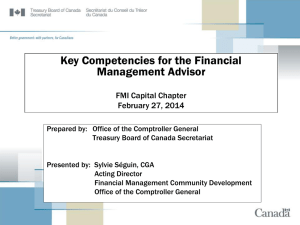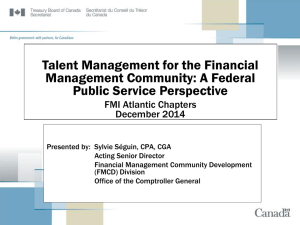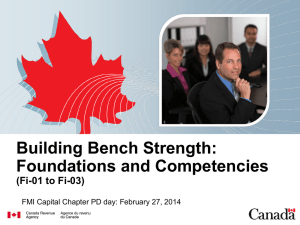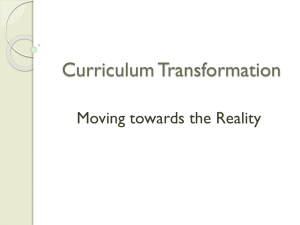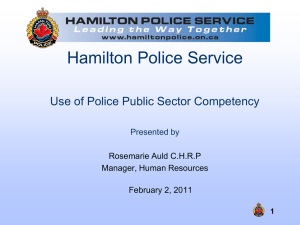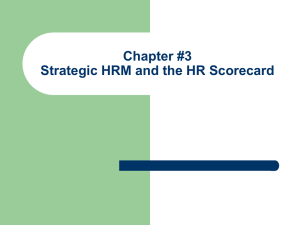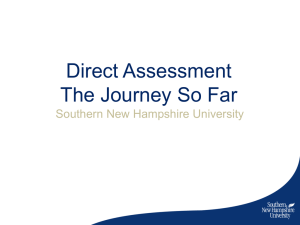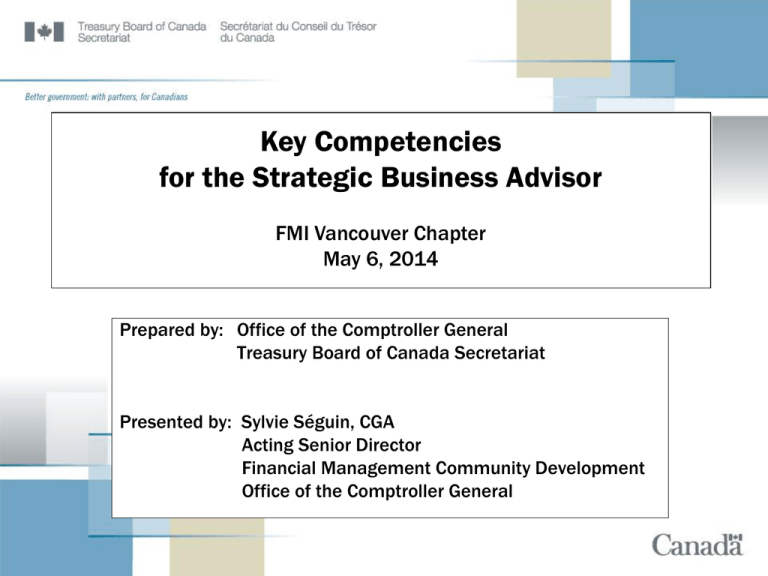
Key Competencies
for the Strategic Business Advisor
FMI Vancouver Chapter
May 6, 2014
Prepared by: Office of the Comptroller General
Treasury Board of Canada Secretariat
Presented by: Sylvie Séguin, CGA
Acting Senior Director
Financial Management Community Development
Office of the Comptroller General
Presentation Overview
Part I: Knowing the Expectations
• Competencies
• The ideal strategic business advisor
Part II: Investing in your Career
• Learning and development tools to support you in
managing your career
• Talent management for the FM community
2
What Are “Competencies”?
Defined as…
The characteristics of an individual that underlie
performance or behaviour at work.*
They are:
Measurable
Observable
“Can do”
+
(Skills, knowledge)
“Will do”
(Behaviour)
=
*Source: Public Service Commission of Canada
Competencies
3
Competency Overview
• The
Competency
Iceberg
Competencies?
are
What
Performance Management — 16
All rights reserved © 2002, Alcatel
4
Who uses competencies?
Competencies are used by:
• Professional accounting bodies (CA, CGA, CMA, CPA)
• Office of the Chief Human Resources Officer
(Key Leadership Competencies)
• Educational institutions
5
Competencies are used as part of sound
Human Resources practices
Statements of Merit
Candidate Assessment Tools
Job Competency Profiles
Professional Dev Program
Learning Curriculum
Learning Plans
Performance Objectives
Performance Assessment
6
Financial Officer Competency
Dictionary
• The key competencies (behavioral and technical) to successfully fulfill
requirements of a job/profession
• There is a progression in proficiency (logical and cumulative)
• Indicators describe behaviors that an employee demonstrates at that
proficiency level
List includes key behaviors for each competency, it is not exhaustive
List has to be manageable and accessible
Each indicator is measurable and uses action verbs
Vocabulary must be relevant to users but also be in plain language
7
Key aspects of each competency
Competency title and short definition
Key indicators associated with each proficiency level
Level 1
Level 2
Underlying Notion Underlying Notion
Level 3
Underlying Notion
Level 4
Underlying Notion
Indicators
Indicators
Indicators
Indicators
Relate to basic
behaviours
Active behaviours
reflecting an
action, a concern
or an attitude
Proactive
behaviours that
are often initiated
based on
knowledge or past
experience
Comprehensive
behaviours that
relate to actions
that have an
impact beyond
one’s immediate
team and more on
the larger
organization
Proficiency levels equate to corresponding FI level
8
FI Competency Dictionary
Oral and Written Communications:
Listening to others and communicating articulately through speech or in writing
FI-01
FI-02
FI-03
FI-04
Listens and questions
effectively
Shares information willingly
Responds constructively to
diverse views
Writes clearly and
concisely, using appropriate
vocabulary and grammar
and message is easily
understood
Maintains timely
communications honestly
and respectfully
Communication flow is
logical and presents a
reasonable sequence of
thoughts
Presents ideas clearly
and persuasively
Communicates in a
manner that generates
enthusiasm and
commitment
Listens to other points of
view and strives to give a
balanced picture
Maintains open and
continuous
communication with
others
Describes complex
financial/technical issues clearly
for both non-financial and
financial audiences
Builds a consensus and
successfully addresses diverse
views
Outlines policy requirements
and provides guidance within
policy
Defends and/or secures
support for ideas or initiatives
through such methods as briefing
notes, position papers, and
recommendations to senior
management
Delivers confident, consistent,
and coherent messages in
presentation
Is sensitive to the timing
of communication relative
to other factors in the
environment
Uses varied
communication systems,
methodologies and
strategies to promote
dialogue and deliver
difficult messages
9
FI Competency Dictionary
Functional competencies
•Financial Accounting and Reporting
•Financial Planning and Resource Management
•Financial Policies
•Financial Systems
10
FI Competency Dictionary
Behavioral competencies
• Oral and Written
Communications
• Risk Management
• Negotiation/Persuading
• Values and Ethics
• Strategic Thinking - Analysis
• Strategic Thinking - Ideas
• Engagement
• Management Excellence Action
• Management Excellence People
• Management Excellence Finance
11
Successful Performers
Poor Performer
Successful Performer
Far Exceeds
Expectations
Successful performers:
– Display professional behaviour in a consistent manner;
– Fulfill job requirements by being productive and
effective at their work level
– Perform at or above the job level (quality, timeliness
and responsiveness) as a matter of course
– Use particular approaches and demonstrate specific
behaviours that facilitate meeting of objectives
12
Hiring the Right People
• Competency-based staffing and selection methods: the
better the “fit” between the requirements of a job and the
competencies of an incumbent, the higher job
performance and job satisfaction will be
• Competency-based staffing tools and methods are
designed to elicit details regarding candidates’ critical
experiences, based on the premise that past performance
is a good predictor of future performance on the job
13
Learning and Development
• Competencies should be used as a basis for the development of
learning plans, and can help managers focus on the learning activities
that best correspond to the development needs of their employees
• Key questions for managers:
Is the individual performing to his/her best ability?
What may be keeping him/her back?
Is the individual ready for a promotion?
Are there other elements that should be considered?
• Key questions for employees:
Am I performing to my best ability?
What is keeping me back?
What other work would I like to perform?
Am I ready for a promotion?
What else do I need to consider?
14
Performance Assessment
• Use of competencies in the performance
management cycle ensures that individuals are
evaluated on criteria that are relevant to the job
and they are aware of these criteria
• It facilitates communication with management
and provides benchmarks against which
performance can be evaluated
• Provides transparency and a greater sense of
empowerment
15
The Ideal Strategic Business Advisor:
Key Competencies
16
The Ideal Strategic Business Advisor
Behaviours
•
Behavioural Competencies
•
Tells the story behind the
numbers
Asks the right questions
•
•
•
•
•
Asks the right questions
Is business-oriented
Is strategic advice–oriented
Understands the big picture
Is an agent of change
•
Is client-focused
•
Engagement
•
Understands risk tolerance
and takes into consideration
risk appetite
•
Risk Management
•
•
Is trustworthy
Is flexible
•
Oral and Written Communications
Strategic Thinking – Analysis
Strategic Thinking – Ideas
•
•
“Leadership”
17
The Ideal Strategic Business Advisor
Behaviours
•
•
•
•
•
•
•
Balances strategic advice
Monitors projects
Alignment of roles
Ensures policies are respected
Supports and facilitates decision
making
Delivers
Implements
Functional Competencies
•
Planning and Resource Management
•
Accounting and Reporting
•
Planning and Resource Management,
Financial Policy and Financial Systems
18
Barriers
Perceptions of finance function:
• Seen as:
focused on itself
rule-bound
the centre for control
process-oriented vs. results-oriented
adding cost to running programs
(i.e., overhead)
19
Part II:
Investing in your Career
• Learning and development tools to support
you in managing your career
• Talent management for the FM community
20
Take Charge of Your Career
• Familiarize yourself with the FI competencies and
the tools and resources in the Employee’s Guide
• Look at competencies at FI-02, FI-03 and FI-04
levels to determine where you need to grow
• Assess your skills and experience using the “FI to
CFO Career Path”
• Develop an action plan
21
Learning and Development Tools
•
•
•
•
•
FI to CFO Career Path
Welcome to Pages
Learning Maps
FI Core Curriculum
Manager’s Guide to Financial Officer CompetencyBased Management
• Self-Assessment in Talent Management for the
Finance Community – Employee Guide to
Competency-Based Management
Available at:
www.gcpedia.gc.ca/wiki/Financial_management_co
mmunity
22
FI to CFO Career Path
23
FI to CFO Career Path (cont.)
24
FI to CFO Career Path (cont.)
25
Welcome to Pages
26
Welcome to Pages
• Available for each FI level in the career path
• Provides guidance to FIs on how to best position
themselves to meet the requirements of their
position and for growth within the FM community
Competencies to develop and master by level
Recommended learning opportunities by level
Development and learning required to reach the
next level
27
Learning Maps
• Learning map for each FI level
• Linked to core curriculum
• Five segments:
Required training
Learning activities needed to do the job
Learning activities to prepare for a future
position
Learning activities to develop leadership skills
Other suggested training
• Provides learning to further develop competencies
and aid in career progression
28
FI Core Curriculum
Developed by the OCG in collaboration with the
CSPS. The curriculum has four streams:
• Basic stream: foundational level courses (F-111,
F-112, F-113)
• Functional stream: core knowledge at the
operational and analytical level – the “how to” of
the curriculum
• Strategic stream: designed to develop participants
critical thinking skills, includes strategic series
• Development stream: complementary training
recommended for all FIs
29
30
Learning Pyramid
10%
Formal Training
20% Feedback and
Coaching
70% Experience
(stretch assignments, shadowing, etc.)
31
Finding opportunities
Volunteer your time and learn new skills:
•
•
•
•
•
•
FMI
Regional councils
Committees
Universities
Non-profit organizations
Boards of directors
32
Talent Management
for the FM Community
33
Current Initiatives in Talent
Management
• Rejuvenated FORD Program
• FM Community: Learning and Professional
Development Needs
• CFO Talent Management
– Institute on Governance
– Next Generation
– On-line pilot with academia
34
Rejuvenated FORD Program
35
FORD Campaigns
Past, Present and Future
Current FORD Program
Eligibility
• Bachelor degree with 6 accounting
courses
Hybrid FORD Program
(Fall 2013 Campaign)
Recent bachelor’s degree with 6
intermediate and/or advanced
courses in accounting or auditing; OR
Bachelor’s degree in any field with a
recent accounting designation
•
Recent bachelor’s degree and acceptance into a
professional accounting designation program
(CPA/CGA)
•
•
2 years standard across all
departments
Experience verification model
Minimum 30 months time in seat, as required by
professional designation program
Experience verification model
•
2 rotations in two years
•
•
•
•
•
Length of program
• Varies by department (1 to 2 years)
Program completion criteria
• 2 rotations in one year
Rejuvenated FORD Program
(Fall 2014 Campaign)
•
•
•
Promotional aspect
• Varies by department
Graduation
• 12 months
Minimum 2 rotations during 30 months
Completion of F111, F112, F113
Successful completion of professional education
program (includes final exams)
Departmental recommendation for promotion
•
Varies by department
•
OCG to create an FI-02 pre-qualified pool of FORD
candidates for those who meet the program
completion criteria
•
•
24 months; and
Successful performance (criteria not
yet finalized)
•
•
•
TBD, but likely to be:
30 months time in seat; or
At some point in time, successful completion of CPA
academic requirements (pre– or post–final exam)
36
FORD Hybrid Campaign
Fall 2013
• Major changes from previous campaigns:
• 24 months and 2 rotations (vs. one year)
• OCG to provide 3 to 4 one-day training sessions
• MOU to reflect 24 months
• Anticipated opening of inventory in Spring 2014:
• Many bilingual candidates
• Inventory numbers based on expected departmental
requirements
• Focus on candidates who pursued a specialization in
accounting
37
FM Community: Learning and
Professional Development Needs
Based on responses to 2012 FM community factbased questionnaire, the following are the learning
and professional development needs identified:
•
•
•
•
Oral and Written Communications
Engagement
Strategic Thinking – Analysis and Ideas
Management Excellence – People
38
CFO Talent Management
Objectives:
• Ensure an adequate future supply of qualified
individuals in the community who can fulfill the
requirements of the CFO position
• Develop a robust system of succession planning
for critical positions within the community
• Identify competency gaps within the CFO
community and its feeder groups and ensure
plans are in place to address them
39
CFO Talent Management
Developmental Initiatives
In collaboration with the FM community, the OCG
developed the following training products:
• On-line Public Sector Financial Management
Leadership Development Program, September
2013
• Comptrollership Leadership Bootcamp – Director
(EX-01) level, September 2013
• Next Gen CFO Course – aimed at future ADM level
CFOs - EX-03 level participants, November 2013
40
CFO Talent Management: Next Steps
• All pilots successfully completed
• Results of recent on-line program to develop
leadership and managerial competencies showed
that FI-03, FI-04, and EX-01 have different
learning needs
• Currently considering a tiered approach to
leadership and management development for
transitional groups at FI-03, FI-04, and EX-01
levels
41
Other Resources
• www.myschool-monecole.gc.ca
• Financial Management Institute of Canada (FMI)
(www.fmi.ca)
• CICA (www.cica.ca)
• CPA (www.cpacanada.ca)
• CMA (www.cma-canada.org)
• CGA (www.cga-canada.org)
http://www.gcpedia.gc.ca/wiki/Financial_management_
community
42
Contact us:
Sylvie Séguin, CGA
Acting Director
Financial Management
Community Development
sylvie.seguin@tbs-sct.gc.ca
613-946-6242
Julie Tremblay, CPA, CA
Special Advisor – Learning and
Development
julie.tremblay@tbs-sct.gc.ca
613-952-3350
Monique Main, CA
Manager, FORD/IARD and CAST
Programs
monique.main@tbs-sct.gc.ca
613-946-7635
43

